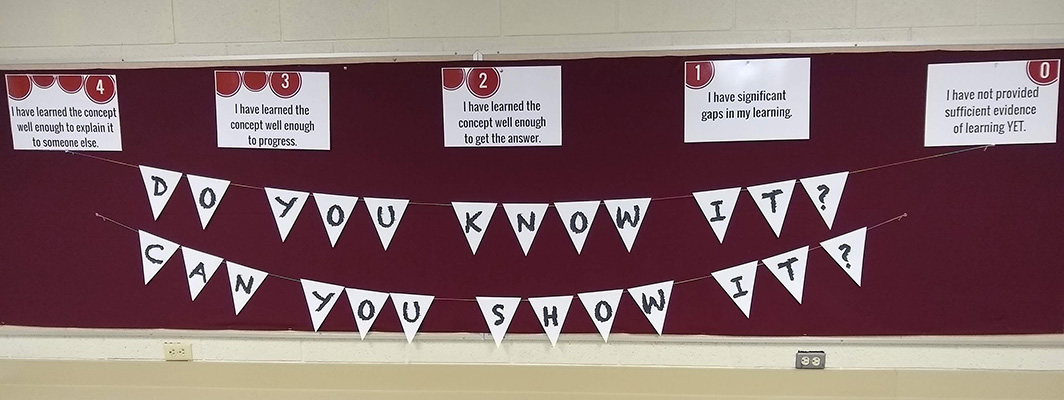
If a student can answer a resounding YES to both questions, that student is able to make progress as a learner. To KNOW the concept is important, but the two questions are fundamentally linked; it’s just as important to SHOW what you know.
Educators have the “know-how” to be effective, but sometimes in the day-to-day shuffle the “show-how” gets lost. Many professional learning opportunities give teachers the chance to add to their bank of knowledge, but don’t encourage teachers to put what they know into action. This is why Digital Promise micro-credentials excite me.
In 2016, I began exploring micro-credentials as a professional learning option for our district. I wondered if perhaps micro-credentials could be the answer to some of our realities: a disillusioned view of current professional development (PD), low interest in face-to-face PD offerings, and an urgent need to engage teachers in the same way we hope to engage our students—personally.
As I started to build a pathway application for teacher leaders in our district, I realized that I could also use micro-credentials to develop MY capacity in my current role. As innovation specialist for Juab School District in central Utah, one of my main responsibilities is teacher support—but there was nothing that uniquely qualified me to offer that support. I wanted to develop my skill set and also model my learning for other educators.
I experimented with a few micro-credentials and then stopped. I was overwhelmed. I doubted myself. I ran out of time. I originally read the details of several micro-credentials and felt confident that I could show proficiency. Then I stalled. It took me several weeks, but I went back to that first micro-credential because I realized that I had to start moving if I wanted to support teachers on their own journeys.
I finally submitted my first micro-credential on a day that my office was quiet. Most of the staff were at a conference, so I sat down at my computer and completed what I had previously started. I was already 90 percent of the way there, but I had to polish a little before I could push submit. I took a deep breath, revisited the goal, and started down my path to teacher leader status.
For this micro-credential, Student Voice and Choice, I submitted artifacts from a research project that my ninth grade English students had completed a few months prior. The micro-credential submission allowed me to share student work and reflections of which I was already proud. As I worked to complete this submission, I realized a powerful need for TEACHER voice and choice as well.
I have also come to realize that many teachers who are curious about micro-credentials feel much like I did on that first submission:
They might be confused.
They may be nervous.
They always feel crunched for time.
They often do the work but don’t push submit.
There is a bravery and vulnerability tied to working in the micro-credential space. It is still relatively new and uncharted; depending on the structures already available, you might be the pioneer.
An educator in Juab School District can earn teacher leader designation by completing the Teacher Leader Pathway, which includes earning four foundational micro-credentials that are directly related to the district’s mission and vision, as well as at least eight additional micro-credentials of choice based on individual job context. When an educator completes the Teacher Leader Pathway, she reviews her work in front of a committee. It stands as a celebration of the work that has already been completed and of the learning that has been done.
It is my daily job to support learning and to help educators have confidence in their practices. With that in mind, I recently had a chance to complete my own micro-credential review. I sat at a table of my peers and shared artifacts from my earned micro-credentials. I answered questions and offered pieces of pride and frustration. Micro-credentials and the work surrounding them have given me a chance to grow in my role. I have confidence when I speak up and share my practices because I have earned micro-credentials that validate my skill set. It felt good to show that to others.
At the end of the day, real learning and growth isn’t always easy. Sometimes it is messy, time consuming, and frustrating. But micro-credentials allow teachers to engage in learning in authentic ways. Micro-credentials ask teachers two questions: Do you know it? Can you show it? This platform for professional learning allows educators to not only add to their bank of knowledge, but also to demonstrate it in authentic ways in their classrooms. It is powerful.
Sign up to start earning your micro-credentials today by visiting the Digital Promise Micro-credential Platform.
Educators in Juab School District use micro-credentials as a system to support professional learning. Each year, cohorts are formed to support micro-credential earning. Visit Digital Promise to learn more. Visit #jsdinnovates to learn more about Juab School District’s Teacher Leader Pathway.